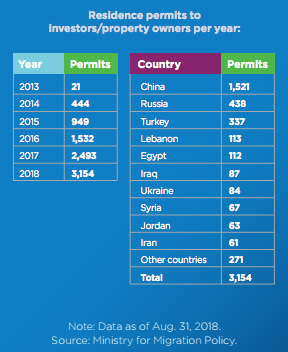Greece will begin lowering taxes and social security contributions in an effort to support economic growth, create jobs and attract investment.
Speaking in the northern city of Thessaloniki, Prime Minister Alexis Tsipras laid out a four-year fiscal boost for the country while continuing to honor Greece’s budget targets
Among the initiatives is a phased reduction in corporate income taxes starting Jan. 1, 2019.
- Over four years to 2022, Greece will cut corporate taxes to 25% from 29% currently.
- Likewise starting next year, social security contributions for the self-employed – who make up the bulk of the Greek workforce – will also be cut by up to 35%.
- Starting in 2019, Greece will cut property taxes by as much as 50% for 1.2 million taxpayers with small real estate holdings, and by 30% on average.
- And from 2021, Greece will cut the top value-added tax rate to 22% from 24%, and the lower tier rate to 12% from 13%.

Golden visa growing rapidly
Greece’s special Golden Visa investment and residency program has soared since the start of the year, reflecting growing investor confidence in the country after it successfully exited its third financial support program this summer.
According to recent data, 3,154 residency permits have been issued under the program through the end of July – more than all of 2017 combined – making Greece’s Golden Visa initiative among the most popular such programs in Europe.
Applications are up 40% from a year ago and Enterprise Greece has been helping to promote the program, most recently with its participation at the International Citizenship Investment Property Fair in Cairo.

Launched in 2013 during the depth of Greece’s economic crisis, the Golden Visa program has come to prominence in the past two years amid waves of new investors from China, Russia and Turkey, among other places. Drawn by Greece’s growth prospects, political stability, quality of life and attractive asset prices, the Golden Visa has surpassed other investment and residency schemes in countries like Cyprus or Portugal.
The program grants a permanent residence permit – and access to 26 Schengen-area countries — to individuals and their families who invest a minimum of €250,000 in fixed assets, such as real estate, in Greece.
The program was recently amended to include investments of €400,000 or more in liquid financial assets as well.
Golden Visa permit holders have invested an estimated €1.5 billion in Greek assets so far.
Greek economy is recovering
Greece’s economy grew at an annual 1.8% rate in the second quarter following an upwardly revised 2.5% rate in the first. The latest provisional data from the Hellenic Statistical Authority, or Elstat, confirm the strength of the Greek economic recovery following an eight year-long recession.
Emerging from recession last year, Greece has posted six successive quarters of positive economic growth and the economy is forecast to grow by about 2.5% this year. The Greek government has also outperformed budget targets set by international creditors. According to the latest data, the Greek state budget posted a primary surplus of €3.1 billion through August, versus a target of €917 million.
“Not only is the country achieving its primary surplus targets, but in the past three years it has surpassed them by a lot, something we expect this year as well,” Mr. Tsipras said at the start of the Thessaloniki International Fair in early September





